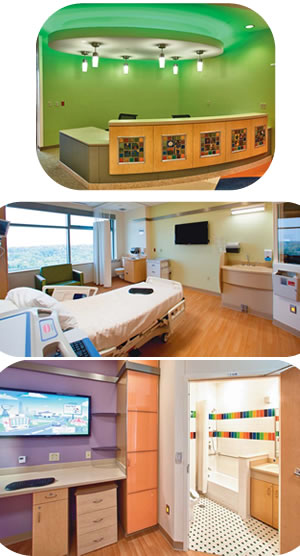A Change of Address

Photos courtesy of U-M
BMT, pediatric cancer care moves to new C.S. Mott Hospital
The internationally recognized University of Michigan Blood and Marrow Transplantation Program has a new home. The adult and pediatric BMT programs, along with all pediatric cancer care, recently moved to the newly constructed C.S. Mott Children's Hospital -- a facility equipped with the latest technology and amenities for patient safety and comfort.
Designed for privacy and efficiency, the new C.S. Mott Children's Hospital and Von Voigtlander Women's Hospital is the community's newest health resource, providing leading specialty services for newborns, children and women. Nearly an entire floor of the 1.1 million-square-foot facility, which consists of a 12-story inpatient tower and an eight-story outpatient clinic tower, is dedicated to the BMT program.
"There is a tremendous benefit from having inpatient and outpatient services integrated, as they are in the new facility," says Daniel Couriel, M.D., former-director of the Adult Bone and Marrow Transplant Program and the Adult Extracorporeal Photopheresis Program. "The biggest advantage is that communication is enhanced between inpatient and outpatient services, and the result is a much smoother patient transition between these areas."
The reason for housing the adult BMT program in the children's hospital has much to do with the fragile health of transplant patients, whose immune systems are compromised as a result of the transplant process. The new Mott facility is equipped with state-of-the-art HEPA-air filtration systems that ensure air quality and protect highly susceptible patients from infections.
The most apparent change is in size, however. The new BMT unit will house inpatient, clinic and infusion services in one larger, central location. Waiting areas, exam rooms and infusion units are all larger, increasing patient comfort and decreasing wait times. The unit has 32 dedicated private patient rooms for adults, which include bathrooms and space for overnight guests. The floor also has lounge, exercise and laundry facilities for guests.
The Extracorporeal Photopheresis Program has also been relocated to a larger space. The ECP program -- one of the largest in the world -- is continuing its research into graft-vs.-host disease, a disorder caused when a newly transplanted immune system attacks the patient's skin and organs.
Because pediatric infusion is also moving to Mott, a portion of Level B-1 in the Rogel Cancer Center will be remodeled, providing space for growing clinical needs as well as patient waiting areas.
"The pediatric infusion area will be converted to provide more space for other clinical services," says Jane Martin, director of clinical operations at the U-M Rogel Cancer Center. "Not only are we gaining a beautiful new home for the BMT program at the children's and women's facility, we're also opening up space at the Rogel Cancer Center for the other clinical areas that are currently overwhelmed."
Continue reading the Winter 2012 issue of Thrive.
